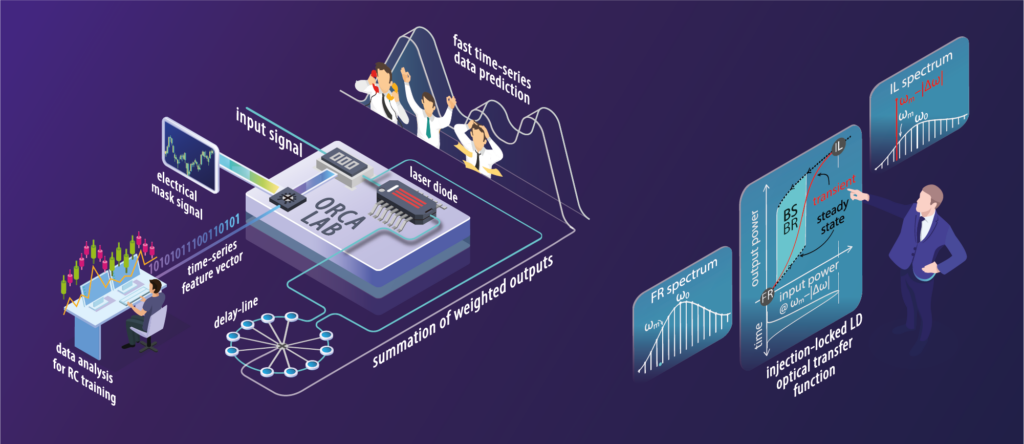
Project objectives:
- To propose and simulate advanced all-optical delayed-feedback RC architectures based on novel adaptive nonlinear node.
- To benchmark hardware implementation of DF-RC based on adaptive nonlinear node
- To employ RC in a case-study of financial market time-series prediction.
The ORCA-LAB project proposes pioneering all-Optical Reservoir Computer Architectures (ORCAs) harnessing the power of the novel, adaptive nonlinear nodes (NNodes), to be demonstrated in a demanding financial forecasting environment, as one of plethora of possible applications. As an outstanding
class of recurrent neural networks (RNNs), reservoir computers (RCs) are extremely efficient in temporal classification, regression and Big-Data prediction, while, due to training simplicity, they exhibit superior performance in comparison with other RNNs and AI architectures and models. All-optical hardware implementations of RCs promise orders-of-magnitude improvement in performance in comparison with the available electronic counterparts in various aspects owing to tremendous bandwidth, inherent wavelength division multiplexing (WDM)-enabled parallelism and low power consumption. To unleash the full potential of the innovative ORCAs’ core – the adaptive NNode based on the bistability of injection-locked multimode semiconductor laser – ORCA-LAB will carry out its in-depth theoretical study employing the system of multimode Lang-Kobayashi rate equations.
The proposed ORCAs will be investigated and benchmarked by developed in-house simulation software package (SSP), on standard datasets for time series prediction tasks and later employed in the challenging case-study of the financial datasets of Belgrade Stock Exchange (BELEX). ORCA-LAB also foresees the experimental activities, which will provide benchmark of a base-case ORCA exploiting the adaptive NNode. In addition to SSP, the project aims to deliver ORCAs with higher processing speed, better overall computational performances, and latency. The advanced solutions of ORCAs design will allow to go beyond the financial market forecasting, and extend its impact to biomedicine, healthcare, automotive industry, power smart grids, etc., opening the path toward ultra-fast real-time applications and photonic accelerators supporting the future Internet of Things and Cyber-Physical Society Processing Systems.
